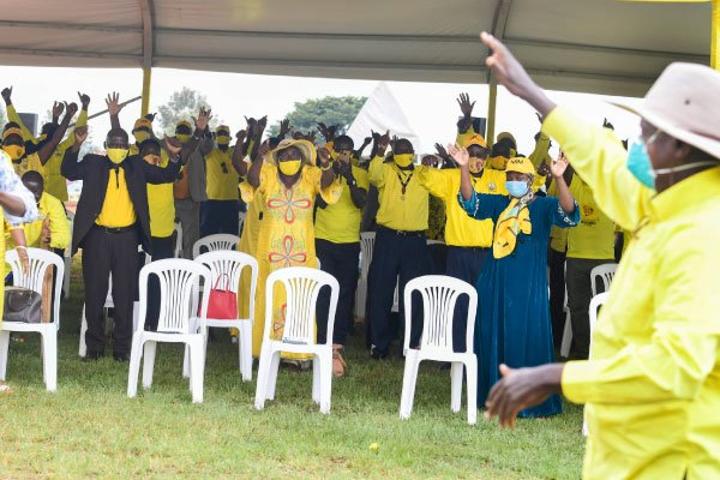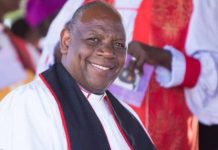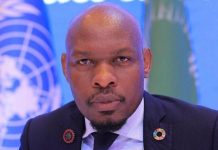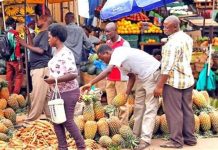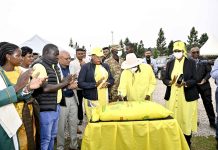Africa-Press – Uganda. The ruling NRM party gained more support in Rukungiri District in last month’s General Election, winning 10 of the 14 sub-county chairperson seats in the district, with FDC taking three while one seat went to and NRM-leaning independent candidate.
FDC had also won three sub-county chairperson seats in 2016 while NRM had 11.
FDC retained the Rukungiri Municipality mayoral seat and won nine of the 15 councillor positions at the same level, down from 11 positions it won in 2016. NRM won six councillor positions, up from four it took in 2016.
The ruling party retained the district chairperson seat and won 33 of the 34 district councillor positions, up from 20 positions it won in 2016. FDC managed to take one seat, dropping from 12 it won in 2016. There were 32 district councillor positions to compete for in 2016.
NRM won three parliamentary seats, up from one it took in 2016, while FDC took one seat down from three it won in 2016.Over all, NRM has taken 53 positions from 36 it won in 2016 while FDC has declined to 15 positions from 30 it won in the 2016 elections.
In the presidential election, President Museveni, the NRM flag bearer, won in the district with 71.4 per cent; Mr Patrick Amuriat, the FDC flag bearer, got 16.8 per cent, while Mr Robert Kyagulanyi, the NUP flag bearer, had six per cent.
In the 2016 elections, Mr Museveni got 48.2 per cent of the total valid votes (116,838) while Dr Kizza Besigye, the then FDC party flag bearer, had 50.4 per cent.
Maj Gen (Rtd) Jim Muhwezi, the Rujumbura MP-elect and NRM district chairperson, explains that NRM’s great achievements in the area over the years ultimately led to its triumph in the elections.
“Before NRM came to power, there was poor education and health systems, poor road network, poverty and insecurity were high, but nowadays, people are accessing free education and health services because the NRM government has at least constructed schools and health centres at almost every sub- county level,” Gen Muhwezi says.
Ruling party’s strengths
He adds: “There is peace and stability that allows every Ugandan to settle down and work for development. In previous regimes, people could spend much of their time in wars, meaning there was no time for development. Where there is peace, people get time to work to improve their standard of living.”
Dr Elisa Rutahigwa, the Rukungiri Municipality MP-elect, says: “President Museveni has made peace with armed groups and defeated militia groups and this is what is keeping us around and alive. Therefore, he deserved our votes.”
Mr Ambrose Kibuuka, the district NRM mobiliser, says the win for President Museveni and NRM party is a testimony that the people of Rukungiri are yearning for service delivery, which they have not earned by supporting opposition leaders.
“The recently introduced Emyooga programme gave people hope. We are going to make sure we sensitise our people how they can benefit from these programmes so that in the 2026 General Election, NRM scores 99 per cent and we paint the whole of Rukungiri Town yellow,” Mr Kibuuka says.
NRM mobilisationHe adds: “If it was not for the strong mobilisation and such government programmes, NRM wouldn’t have performed well in Rukungiri. People should know that it is in Rukungiri where the Opposition has its deep roots, meaning our win was out of serious battle.”
Mr John Nathen Mugisha, a religious leader, attributes the NRM victory to the various development initiatives that the party has extended to the area such as water, electricity and road projects.
“With the introduction of these projects, people have been able to get jobs and have supported their families with basic needs,” Mr Mugisha says.
Disunity among the Opposition members (FDC) is another factor exploited by the NRM to win back the district.
There were three FDC-leaning candidates; Dr Wallen Tumwine (party flag bearer), Ms Ingrid Turinawe and Mr George Owakukiroru competing for Rukungiri Municipality MP seat while NRM had one. The opposition votes, therefore, were divided among the three, the reason FDC failed to retain the seat.
Dr Rutahigwa of NRM polled 5,588 votes, Dr Tumwine (FDC) got 3,584 votes, Ms Turinawe (Ind) polled 2,666 votes while Mr Owakukiroru (Ind) polled 1098 votes.
The total votes of the three candidates clearly shows that if FDC had one candidate, NRM wouldn’t have won the parliamentary seat.
Ms Mary Rwabugira, the director Pearl Link International, a non- governmental organisation that advocates women rights in south-western Uganda, says she voted President Museveni and the NRM candidates in the district simply because of the freedom the ruling party government has created.
She says the previous regimes did not take them as human beings but with NRM, women are also given an opportunity to be leaders and managers in workplace, which she says is promoting equality.
She also attributes NRM’s victory to establishment of grassroots structures.
“Mzee [President Museveni] had strong grassroots representatives which the opposition leaders didn’t have; so there is no way we can vote opposition parties that fielded candidates who were not known by voters. NUP, fore example, had no agents in the district,” Ms Rwabugira says.
Besigye’s decision
Ms Viliginia Kyarugahi, the district FDC chairperson, says the decision by Dr Kizza Besigye not to run for presidency greatly helped NRM to win in Rukungiri.
“There is no way you can vote for a person who is not well known to the people, most people in Rukungiri know Besigye and Museveni and failure by one to run for presidency, made it hard for some of us to get an alternative to vote for. So we ended up voting for NRM and President Museveni,” Ms Kyarugahi says.
The same was echoed by Mr Arthur Ndakwenda, a businessman in Rukungiri Town. “We all had been voting FDC because of Besigye; well Amuriat was also good but he couldn’t fit in the shoes of Besigye and even the few votes he got in Rukungiri was because of Besigye. So Besigye’s decision [not to stand] contributed to the party’s poor performance in the elections,” he says.

